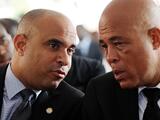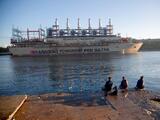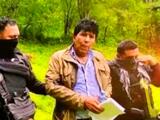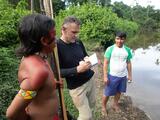Honduran president planned to shove drugs "right up the noses of the 'gringos',” according to witness in New York drug case
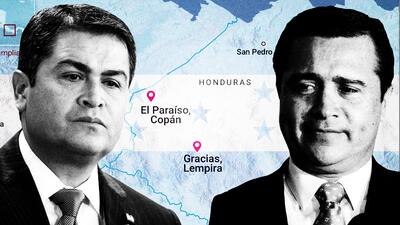
A document filed Friday by federal prosecutors in New York makes new drug trafficking allegations against President Juan Orlando Hernández of Honduras, who allegedly told a co-conspirator that he was going to “shove the drugs right up the noses of the gringos.”
The 49-page document was released in relation to the upcoming trial of Geovanny Fuentes, who was arrested in Miami in March 2020 on drug trafficking and weapons charges and is accused of working “with other violent, large-scale drug traffickers to import thousands of kilograms of cocaine into the United States.”
The arrest of Fuentes followed the October 2019 conviction of the president’s brother, Tony Hernández, who is also listed as a co-conspirator and who according to prosecutors “was managing drug-trafficking activities in Honduras.”
The latest revelations come just before President-elect Joe Biden will take office on January 20, who analysts expect will take a harder line against his Honduran counterpart than President Donald Trump, who has largely turned a blind-eye to the accusations so long as Honduras has bent to the will of his administration’s immigration agenda.
President Hernández, who prosecutors allege received millions in bribes from drug traffickers, including from the former head of the Sinaloa Cartel, Joaquin ‘El Chapo’ Guzman, has vehemently denied all accusations of involvement in drug trafficking.
“The claim that Pres. Hernandez supposedly accepted drug money from a Geovanny Daniel Fuentes Ramirez, or gave protection or coordination to drug traffickers is 100% false, and appears to be based on lies of confessed criminals who seek revenge and to reduce their sentences,” an official Honduran government Twitter account stated in response to the latest allegations.
President Hernández is identified as ‘CC-4’, or co-conspirator 4, in the document, but the context clearly indicates that he is the person referenced.
According to prosecutors, in 2013, Juan Orlando Hernández, who at the time was campaigning for his first term as president, met at least twice with Fuentes at the office of a local businessman and major campaign donor, Fuad Jarufe. Hernández allegedly frequented Jarufe’s office, including on one occasion in which he is quoted as gloating about “embezzling aid money provided by the United States through fraudulent non-governmental organizations and stealing money from Honduras’s social security system.”
“We are stealing better than in the days of Callejas,” said Hernández during that meeting, according to a source with direct knowledge of the case and who spoke exclusively with Univision on the condition of anonymity. The alleged reference by Hernández is to former President Rafael Callejas, who is considered by many to be one of the most corrupt Honduran presidents.
A previous Univision investigation details how politicians have embezzled millions through shell non-profits.
During the meetings with Fuentes, Hernández allegedly told him that he was interested in access to a cocaine laboratory supposedly operated by Fuentes because of its proximity to Puerto Cortés, a key shipping port on the northern coast of Honduras.
Fuentes is alleged to have operated a laboratory since at least 2010 with another drug trafficker named Melvin Sanders, who is identified in the document as CC-1, or co-conspirator 1, producing roughly 200 to 300 kilograms of cocaine per month. Sanders introduced Fuentes to the leaders of the notorious Cachiros crime family, including Devis Rivera Maradiaga, who is now testifying against Fuentes.
In exchange for alleged bribes totaling roughly $25,000 and access to the laboratory, Hernández agreed to provide protection for Fuentes and his drug trafficking activities through the military and the nation's Attorney General, and instructed him to “report directly to Tony Hernandez for purposes of drug trafficking.”
After the meetings, Fuentes began receiving support from high-ranking military officers, including gifts of a machine gun, military uniforms, bullet proof vests and police badges. The officer who coordinated the support was René Orlando Ponce Fonseca, who at the time was commander of the powerful 105th Military Brigade and who is identified in the document as CC-13, or co-conspirator 13, according to a source with direct knowledge of the case and who spoke exclusively with Univision on the condition of anonymity.
Ponce Fonseca was later appointed by President Hernández to be the head of the joint chiefs of staff of the Honduran armed forces in 2017. Ponce Fonseca also protected Fuentes from arrest in Honduras, according to the source.
Fuentes allegedly received protection from high-ranking members of the national police, including Leonel Sauceda, one of the nation’s top cops who was charged with money laundering last year and is identified in the document as CC-9, or co-conspirator 9.
After his arrest, in an interview with DEA officials, Fuentes made a number of admissions that could be used against him at trial. Among other things, he admitted to having a relationship with several drug traffickers, to owning the property where the drug lab was found and to having a relationship with the businessman Jarufe, who he said was a contributor to Hernández’s campaigns.
While in jail, Fuentes allegedly told one of the leaders of the Cachiros gang, Devis Rivera Maradiaga, that he blamed Hernández for his detention. He said the president had sent a military official to meet with him and another co-conspirator, to arrange for one of the Fuentes’ companies launder millions of dollars.
The trial for Fuentes is scheduled to begin on March 8. Meanwhile, President Hernández’s brother, Tony, is set to be sentenced later this month after a year-long delay owing primarily to the pandemic.

